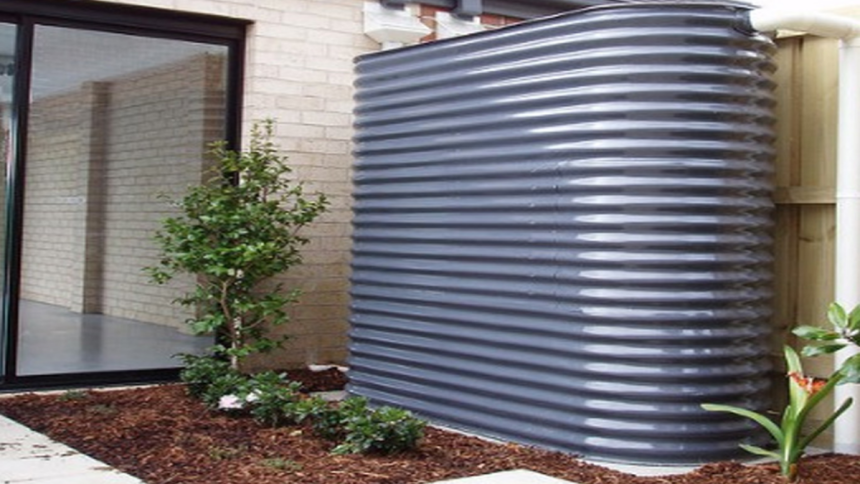It’s no secret that Australia has a dry climate. Water scarcity is also a concerning issue in many parts of the country. However, many property owners are combating this issue by installing a rainwater harvesting system.
This may sound like an incredibly complex process to the average novice. However, homeowners will be delighted to learn that it can be done by the plumber Brisbane locals use for all things plumbing-related.
Water Harvesting Simplified
As the name suggests, water harvesting refers to the process of gathering or catching rainwater. In this process, large water tanks and specialised gutter pipes are installed in strategic places around your home, garage or shed.
Rainwater falls onto the roof and flows down the downpipes into the tanks. A tap is installed lower on the tank so that you can let water out into buckets or even attach a hose to water gardens or crop fields.
Everyone Should be Doing It
Statistics have shown that about 1 in 4 Australian homes have water tanks installed on their property and it’s easy to see why. Our water harvesting specialists have shared the top ways that you will benefit from investing in this process.
1. Considerably More Cost-Effective
The number one reason to invest in a rainwater system is that you’ll see a drastic reduction in your water bill. Yes, there will be the initial expense of the system and all the components, but you’ll definitely see a long-term saving on the overall water expense.
Many homeowners still prefer to use municipal water for drinking, cooking and bathing. Rainwater is then used for flushing toilets, gardening, and washing cars. Depending on the size of your garden, this can show a considerable saving.
2. Makes Your Property More Sustainable and Self-Efficient
If you’re serious about being self-sufficient and making your property more sustainable, then a rainwater system is the best place to start. This is especially the case if you’re living in an area with water scarcity.
Harvesting rainwater allows you the freedom to use water as you need it. A huge plus here is that the system is relatively simple to install and super easy to operate. Using this system to reduce your carbon footprint is not only easy but effective too.
3. Reduces the Effects of Soil Erosion
When you use municipal water, you do not need rainwater. This means there’s more of it falling on your gardens and crop fields. Ultimately, this increases stormwater runoff which in turn causes higher soil erosion and localized flooding. Whether you’re growing veggies or native plants, your garden will definitely benefit.
4. Access to Softer Water
Water from your area’s main supply contains a wide variety of chemicals such as fluoride, chlorine, and calcium. While these chemicals clean and purify the water, they also create what’s known as “hard water”.
Typically, hard water can cause long-term damage to your plumbing pipes and even appliances such as dishwashers and washing machines. This is because the chemicals build up on the inside of these appliances.
Hard water also has negative effects on plant growth. Since rainwater has a neutral pH, opting to give your plants softer rainwater will ensure that you have healthier yields.
5. Has a Much Better Taste
As we’ve mentioned, some homeowners prefer to use rainwater only for outdoor functions. However, by adding a comprehensive filtration system and following the guidelines shared by your plumber, your rainwater can be used as drinking water. You’ll soon notice that clean, filtered rainwater tastes amazing!
6. Reduce the Need for Groundwater
Many homeowners avoid using water from the main system by opting to use groundwater. While this may seem like a good idea, the reality is that the need for extensive quantities of water places tremendous pressure on local environments.
Moreover, groundwater isn’t always available in the quantities required by homes that not only have large crop gardens but also deal with water scarcity as well. Choosing to use rainwater rather than groundwater is essential in keeping water supplies available and safe to use by future generations.
7. Allows You to Be a Part of the Bigger Picture
More often than not we don’t realise how fortunate we are to live in a world that has access to clean, fresh drinking water. With an increase in demand for water and more of it getting contaminated, the privilege of clean water may not be afforded to future generations.
Collecting rainwater places less strain on municipal systems to process and provide fresh water. Using rainwater means you’re taking a huge step toward water conservation.
Final Thoughts
There are many benefits associated with installing a rainwater system on your property. With a variety of customizable options on offer, you can choose the best type of system to suit your property’s needs.
Follow the simple instructions offered by the plumber assisting with the initial installation and you’ll be well on your way to enjoying healthier, cleaner water at a fraction of the price!
Lynn Martelli is an editor at Readability. She received her MFA in Creative Writing from Antioch University and has worked as an editor for over 10 years. Lynn has edited a wide variety of books, including fiction, non-fiction, memoirs, and more. In her free time, Lynn enjoys reading, writing, and spending time with her family and friends.















